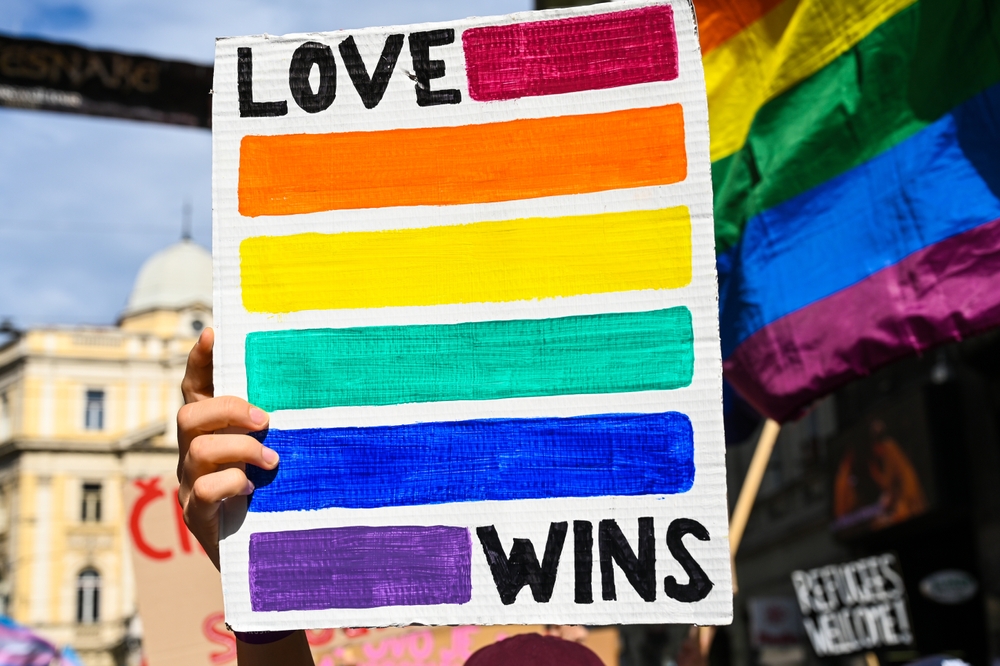- Justice and equality for intersex people
- The Union of Equality: EU Strategies Against Structural Discrimination
- LGBTIQ+ Action Plans: Checklist for a gender equal society
- Equal Rights for Rainbow Families
- Protecting LGBTIQ+ people from violence and hate speech
- Towards a European strategy for the equality of LGBTIQ people
Justice and equality for intersex people
The I in LGBTIQ+ stands for intersex people. These are people whose sex characteristics cannot be clearly categorised as either female or male.
Intersex people experience human rights violations and discrimination. Particularly problematic are surgical and other medical interventions performed on intersex babies or young children without their consent.
The United Nations considers these interventions to be human rights violations, and the Council of Europe recommends that its Member States legally prohibit them. Intersex activist organisations such as OII Europe have developed and published criteria for good practice in policy-making to protect intersex children.
In the context of the legally required evaluation of the German law banning surgical interventions on intersex children (§ 1631e BGB), the Council of Europe Recommendation on Equality for Intersex People and recent developments in several European states, the Observatory has been working on a European comparative analysis of Germany, Malta, and Portugal. The analysis aims to deepen our understanding of the diversity of regulation when it comes to banning surgical and other medical interventions on the sex characteristics of intersex people, and to shed some light on the implementation of such regulation.
The Dossier engages with the human rights situation of intersex people in Europe.
The Union of Equality: EU Strategies Against Structural Discrimination
The 'Union of Equality' is a key objective of the European Union, as defined by Commission President Ursula von der Leyen in 2019. Adopting an intersectional approach, the goal is to establish a society that respects diversity and ensures equal opportunities and rights for all.The EU Gender Equality Strategy 2020-2025 and the EU LGBTIQ Equality Strategy 2020-2025, and their status of implementation in selected areas, will be presented. Furthermore, insight will be provided into the EU's new equality initiatives for the current legislative period from 2024 to 2029.
Please note that the background information is only published in German.
Equal Rights for Rainbow Families
In recent years, rainbow families have become more prevalent as diverse family forms in Germany as well as in Europe. Nevertheless, there is still a need for political and legal action to advance equality. The Working Paper highlights the need for change and solution approaches and provides insights into the regulations of European countries.This Working Paper deals, among other things, with legal and social parenthood, also, for example, multiple parents, the use of assisted reproduction and its legal consequences for parenthood, and the need to address, redress and compensate for past injustices that made parenthood difficult, if not impossible.
LGBTIQ+ Action Plans: Checklist for a gender equal society
National Action Plans have been established as a central and effective tool for the implementation of values codified in international law at national levels, such as the protection of human rights. In the area of human rights of LGBTIQ+ persons, it can be observed throughout Europe that the implementation of National Action Plans systematically advances the equality of LGBTIQ+ persons.The Expertise introduces the tool National Action Plan and summarises demands at the European and German levels for a National LGBTIQ* Equality Action Plan in Germany. The emphasis lies on a process analysis of drafting, implementation and evaluation as well as on success factors regarding these steps.
With this expertise and the two working papers on rainbow families and hate crimes against LGBTIQ+ people, the Observatory contributed substantively to the preparation of a National Action Plan regarding the rights of LGBTIQ+ persons in Germany, which was announced by the German Federal Government on 18 November 2022.
Protecting LGBTIQ+ people from violence and hate speech
Hate crimes against LGBTIQ+ people are the most severe expression of homophobia and transphobia. They are not uncommon in Germany and other European countries, whether in public or private. For those affected, this represents a considerable burden and stress as well as a restriction of freedom and participation in social life.
The Working Paper shows that on the one hand, changes in criminal law are needed to fight hate crime against LGBTIQ+ persons more effectively. On the other hand, non-legal measures – for instance, in the work and training of the police, the judiciary and within victim support – need to be developed and implemented.
Towards a European strategy for the equality of LGBTIQ people
In February 2020, EU Commission President Ursula von der Leyen announced that she would publish a strategy for the equality of LGBTIQ people for the first time.In advance of the publication of this strategy, this Newsletter initially provides an overview of the existing legal framework and current political processes at the EU level and the situation of LGBTIQ persons in the EU Member States. Following this, two articles present the requirements for the announced strategy from a legal and civil society perspective. The focus here is on the EU-wide recognition of rainbow families and the increasing attacks and hate speech against LGBTIQ people.
Subsequently, two contributions will outline requirements for the announced strategy from a legal and civil society point of view. The focus is on the EU-wide recognition of rainbow families as well as the increasing attacks on and incitement to hatred against LGBTIQ persons.
The ensuing article provides an excursus on another organisation, the Council of Europe, which adopted the world’s first instrument to combat discrimination based on sexual orientation or gender identity over ten years ago, the so-called Recommendation CM/Rec(2010)5 of the Committee of Ministers from 31 March 2010.
The conclusion is an overview of existing national action plans for LGBTIQ people.















